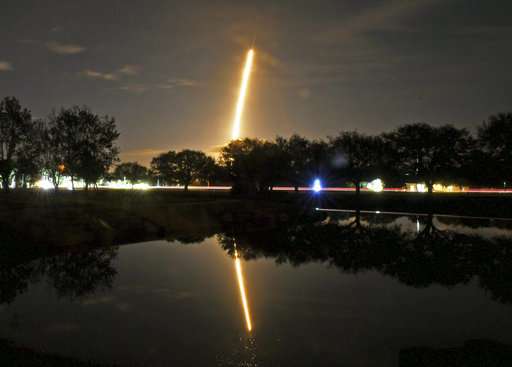In this image made with a long exposure the SpaceX Falcon 9 rocket launches from Cape Canaveral Air Force Station as seen from in Viera, Fla., Sunday, Jan. 7, 2018. SpaceX has launched a secret satellite codenamed Zuma on its first flight of the new year. (Tim Shortt/Florida Today via AP)
SpaceX on Sunday blasted off a secretive US government payload known as Zuma, a mission whose nature—and the agency behind it—remains a mystery.
"Three, two, one, ignition and liftoff," said a SpaceX commentator as the Falcon 9 rocket launched under cover of darkness from Cape Canaveral, Florida, at 8:00 pm (0100 GMT Monday).
The launch was initially supposed to take place in November but was postponed so the California-based company could take a closer look at potential problems with the fairing, or the nose cone part of the rocket that protects the payload.
Just what exactly needed such special protection and secrecy is still unknown.
Northrup Grumman, the maker of the payload, said it was for the US government and would be delivered to low-Earth orbit, but offered no other details.
SpaceX and the Pentagon did not respond to requests for comment about the nature of the mission.
SpaceX has launched national security payloads in the past, including a spy satellite for the National Reconnaissance Office, and an X-37B space plane for the US Air Force.
The company's live webcast did not show video coverage of the Zuma spacecraft after it separated from the first stage of the rocket, but confirmed that the fairings deployed and the payload was well on its way to low-Earth orbit.
After launch, SpaceX returned the tall portion of the Falcon 9 rocket to an upright landing at Cape Canaveral.
Cheers erupted at SpaceX headquarters in Hawthorne, California as the rocket glided seamlessly down to ground.
SpaceX chief executive Elon Musk's goal is to perfect the technique so that rockets can one day become just as reusable as airplanes, thereby lowering the cost of space travel.
© 2018 AFP






















